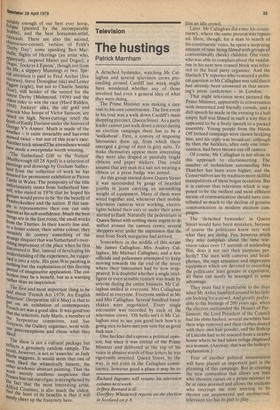The hustings
Patrick Marnham
A detached bystander, watching Mr Callaghan and several television crews pro ceeding around Cardiff last week might have wondered whether any of those involved had even a general idea of what they were doing.
The Prime Minister was making a rare visit to his own constituency. The first event in his tour was a walk down Cardiff's main shopping precinct, Queen Street. As a party leader cannot just walk down a street during an election campaign there has to be a `walkabout'. First, a convoy of imposing limousines drew up, from which there emerged a group of men in grey suits. To make themselves appear more interesting they were also draped in painfully bright ribbons and paper stickers. One could assume that any man in a suit not wearing a ribbon or a press badge was armed.
As this group started down Queen Street it was surrounded by gangs of bearded youths in jeans carrying an astonishing weight of equipment. Many of them were wired together and, whenever their mobile television cameras were working, electric lights behind their ears or under their arms started to flash. Naturally the pedestrians in Queen Street with nothing more urgent to do milled around the camera crews; several shOppers were under the impression that the man from Stork margarine had arrived.
Somewhere in the middle of this scrum Mr James Callaghan, Mrs Audrey Callaghan, Mr Michael Callaghan, and a few officials and policemen attempted to keep moving towards the far end of the street where their limousines had by now reappeared. It is doubtful whether a single intelligent or even sensible remark was made by anyone during the entire business. Mr Callaghan smiled at everyone. Mrs Callaghan smiled at everyone. Everyone smiled at Mr and Mrs Callaghan. Several hundred handshakes were negotiated. Every single encounter was recorded by each of the television crews. `Oh hello isn't it Mr Callaghan nice to see you good luck how's it going nice to have met you vote for us good luck nice.'
One heckler did express a political opinion, but since it was critical of the Prime Minister and delivered at the top of his voice in abusive words of four letters he was vigorously arrested. Queen Street, by the way, is not even in the Callaghan constituency, however good a place it may be to
Richard In grams will resume his television column next week.
Jeffrey Bernard is ill.
Geoffrey Wheatcroft reports on the election in Scotland on p.8.
film an idle crowd.
Later, Mr Callaghan did enter his constituency, where the same process was repeated. Here, though, for a man in search of his constituents' votes, he spent a surprising amount of time being filmed with groups of conventionally cheeky children. One voter who was able to complain about the vandalism in his neat new council block was referred to the local party organiser. And the Harlech TV reporter who ventured a political question to Mr Callaghan was told that it had already been answered at that morning's press conference — in London.
That night television news pictured the Prime Minister, apparently in conversation with interested and friendly crowds, and a dull speech he made in the evening to a half empty hall was filmed in such a way that it appeared to be a lively speech to a packed assembly. Young people from the Hands Off Ireland campaign were shown heckling him, and his reply was broadcast: although by then the hecklers, after only one intervention, had been thrown out off camera.
Of course, Mr Callaghan is not alone in this approach to electioneering. The number of technicians surrounding Mrs Thatcher has been even higher, and the Conservatives are by tradition more skillful manipulators of these bogus occasions. But it is curious that television which is supposed to be the swiftest and most efficient means of communication should have contributed so much to the decline of genuine communication in modern election campaigns.
The 'detached bystander' in Queen Street would have been mistaken, because of course the politicians know very well what they are doing. For, however much they may complain about the time television takes over 15 seconds of misleading film, does it not suit their purposes perfectly? The men with cameras and headphones, the rapt attention and impressive equipment which are devoted to recording the politicians' least gesture or expression, all these can surely be managed to some advantage. _ _ They must find it preferable to the days when Mr Attlee bumbled around in his little car looking for a crowd. And greatly preferable to the hustings of 200 years ago, when the electors surrounded the Houses of Parliament, the Lord President of the Council had his shins hacked, several members had their wigs removed and their clothes dusted with their own hair powder. and the Bishop of Lincoln had to be rescued from a nearby house where he had taken refuge disguised as a woman. (Anyway. that was the bishop's explanation.) Fear of another political assassination will have played an important part in the planning of this campaign. But in creating the new convention that allows any man who showers curses on a prime minister to be at once arrested and allows the students who interrupt the cosy meeting to be thrown out unanswered and unobserved, television too has its part to play.






































 Previous page
Previous page